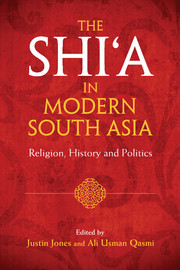Book contents
- Frontmatter
- Contents
- Preface
- Introduction
- 1 Faith Deployed for a New Shiʿi Polity in India
- 2 The Ismaʿili – Isna ʿAshari Divide Among the Khojas
- 3 Local Nodes of a Transnational Network
- 4 Shiʿism, Humanity and Revolution in Twentieth-century India
- 5 Universalising Aspirations
- 6 Muslims, Media and Mobility in the Indian Ocean Region
- 7 Shariʿa, Shiʿas and Chishtiya Revivalism
- 8 Third Wave Shiʿism
- Contributors
- Index
8 - Third Wave Shiʿism
Published online by Cambridge University Press: 05 May 2015
- Frontmatter
- Contents
- Preface
- Introduction
- 1 Faith Deployed for a New Shiʿi Polity in India
- 2 The Ismaʿili – Isna ʿAshari Divide Among the Khojas
- 3 Local Nodes of a Transnational Network
- 4 Shiʿism, Humanity and Revolution in Twentieth-century India
- 5 Universalising Aspirations
- 6 Muslims, Media and Mobility in the Indian Ocean Region
- 7 Shariʿa, Shiʿas and Chishtiya Revivalism
- 8 Third Wave Shiʿism
- Contributors
- Index
Summary
Pakistan's Shiʿas barely had time to celebrate the energising success of the Iranian Revolution. The events of 1979 endowed them overnight with a sudden but ultimately only illusory claim to the leadership of Islamism. Already the early 1980s witnessed rising tides of anti-Shiʿi sentiments instead. Even though sectarian violence was hardly foreign to South Asia, the following decades bore witness to a far deadlier climate. The Islamisation initiatives of General Zia ul-Haq (r. 1979–1988), with their exclusive focus on the implementation of Hanafi fiqh, prepared the ground for an unprecedented rise of inter-sectarian tensions in Pakistan. Radical and politicised lay activists were drawn to ever more uncompromising groups. Additionally, the jihad against Soviet forces in neighbouring Afghanistan as a training ground for militants figured importantly in the equation on the Sunni side. The latter was coupled with Saudi-Arabian ‘humanitarian aid’ that extended to the financing of virulently anti-Shiʿa tracts such as Ihsan Ilahi Zahir's Al-Shiʿa wa-l-Sunna that claimed Shiʿism to be “the religion of falsehood (din al-kidhb), and the religion of deceit and cunning (din al-khida wa-l-makr), and telling lies for ever and ever; and there is no escape from it”. Scholars have also noted triggering socio-economic factors, for example rivalries between a rising Sunni middle class and locally dominant Shiʿi landholders, aggravated through labour migration to the Gulf.
Given these turbulent times, it is thus not surprising that the existing literature on the Shiʿi community of Pakistan has so far taken much more interest in inter-sectarian conflict than in the changes which affected Shiʿi thought post-1979. The precise influences of the ‘iranian moment’ are far more often assumed than actually established, as demonstrated by the following, rather typical statement:
As a consequence of the Iranian Revolution and the resultant Shiʿi religiopolitical activism, Shiʿism in Pakistan became more centralised, more clericalist, more Iranianised, and more integrated with the international Shiʿi community. The revolution especially reinforced the emotional and religious bonds of Pakistani Shiʿah with Iran and its religiocultural centres.
- Type
- Chapter
- Information
- The Shi‘a in Modern South AsiaReligion, History and Politics, pp. 179 - 202Publisher: Cambridge University PressPrint publication year: 2015
- 1
- Cited by



